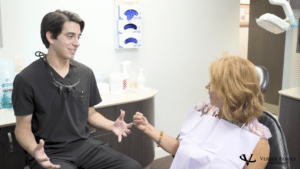Do you feel your teeth moving, shifting, or feeling loose? Have you noticed new gaps or spaces? Do you commonly find food getting stuck in between your teeth? If so, you might be wondering if your teeth are shifting and what it means.
Although the American Association of Orthodontists (AAO) says that changes in tooth position can change through your lifetime, movement of your teeth can be a sign of a more serious problem that will get worse without professional guidance.
If you have noticed shifting in your teeth, it’s helpful to know why it may be happening so you can discuss it with your dental professional.
Here are some of the most common reasons your teeth are moving:
Gum Disease
Your teeth are secured because your tooth roots are embedded in your jawbone. When you have gum disease, also called periodontitis, the infection spreads from your gums to the jawbone. That infection deteriorates that bone that is holding in your teeth. Without periodontal treatment, the gum infection will advance and cause tooth mobility and ultimately tooth loss. Periodontal disease is a severe mouth infection that can affect more than just your mouth. Studies show that periodontitis is linked to many health problems.
Treatment for periodontal disease helps to rebuild lost bone and improve your tooth stability, gum health, and overall health.
Grinding/Clenching
The roots of your teeth are secured to the bone by periodontal ligaments (PDL). When you grind or clench your teeth, you put pressure on those ligaments causing a widened ligament because they are inflamed. Since the PDL supports the bone surrounding the tooth, if it is weakened, teeth can shift or become loose.
If you grind or clench, the dentist will check your occlusion, which is the way your teeth fit together. Your dentist can help by fabricating a bite guard. Bite guards, sometimes called night guards are an effective way to prevent PDL enlargement and keep your teeth stable.
Missing Teeth
Every tooth in your mouth has an important role, helping you chew and holding its space in your jawbone. When you have had teeth extracted, the remaining teeth can shift causing gaps, spaces, and food trap areas.
If you have had past extractions or need an extraction, the best way to prevent movement is by replacing missing teeth with implants.
We’re here to help, contact us at 717.737.4337 or visit the Pennsylvania Center for Periodontology where they provide a full periodontal examination and guidance for ways to stabilize your teeth.





